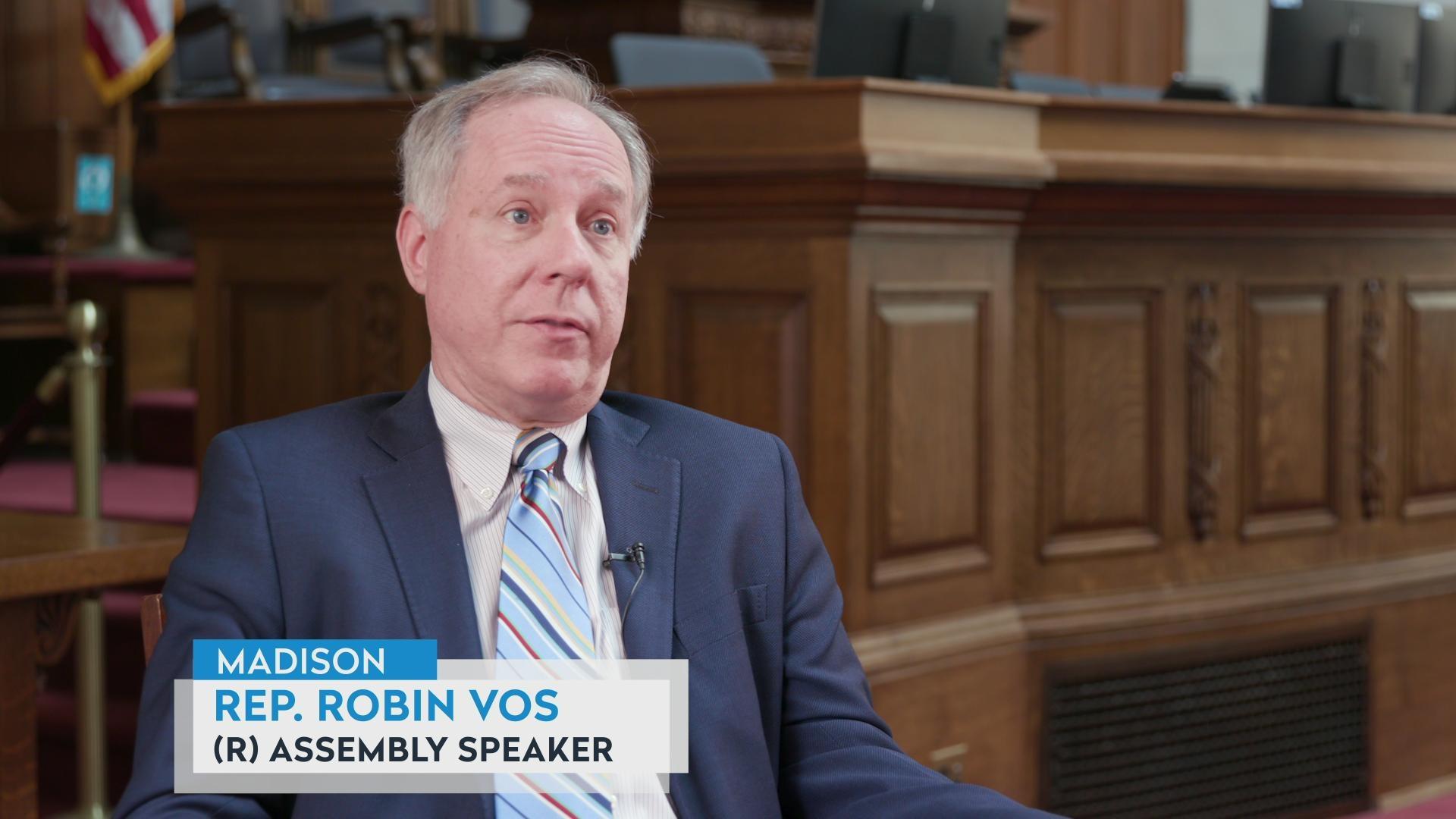Frederica Freyberg:
As we’ve said, the promise of thousands of Foxconn jobs comes with the price tag of $3 billion in state tax credits. The largest incentive package in state history. The memorandum of understanding between the state and the company contains few details, but those are expected in a full bill to be brought in that special session of the legislature. We turn now to a UW economist whose expertise includes public financing of private industry projects. Steve Deller is a professor of agriculture and applied economics at UW-Madison. Thanks a lot for being here.
Steve Deller:
Thank you.
Frederica Freyberg:
So, the Foxconn package dwarfs previous incentives to attract or retain jobs. What’s your reaction to it?
Steve Deller:
Wisconsin historically has not played this game. They will put together a reasonable package and say, “Take it or leave it.” But this particular one is kind of passes that red line that we’ve had historically. But, this is not just a cash give away. This is the company has to hit a series of benchmarks. And if the company doesn’t hit these benchmarks, the incentives don’t apply. And they can actually–the state can actually claw them back, essentially saying, “You didn’t do what you promised, give us some of the money back.”
Frederica Freyberg:
So you feel as though that’s enough of a protection with this size of an incentive package?
Steve Deller:
Those kind of protections have to be in place. Otherwise it is just a pure give away. And that would be a bad deal for the state of Wisconsin. The devil’s in the details and those details are starting to come out. It appears as though most of the incentives are actually tax breaks. So this doesn’t look as though it’s going to be money out of the pocket of taxpayers, but rather taxes that the company and particularly the construction phase, they don’t have to pay those taxes.
Frederica Freyberg:
Wisconsin already has the manufacturing and ag credits, which I understand reduces Foxconn's corporate income tax rate to .4%, but additionally they get what I understand to be refundable tax credits, which to my ear sounds like kind of cash in hand.
Steve Deller:
It is to an extent in that it’s taking away from their tax bill. In the end, the company will probably be paying very low in terms of taxes, particularly income taxes. So, it is not money that we’re giving back, or giving to the company, it’s money that we would not be receiving if these incentives weren’t in place.
Frederica Freyberg:
In your first response you said we kind of crossed the red line and you also described how previously there were “reasonable kind of incentive packages.” So, what do you mean by crossing the red line and do you think this is unreasonable?
Steve Deller:
It's the game that states start to play. It’s been referred to as the “new Civil War.” States will start bidding against each other to attract a company like this. And some states get wrapped up in that game. They get so focused on winning the game that they sometimes lose track that they are playing with taxpayers’ money. The state historically has not played that game. They will do things like we will invest in infrastructure if you need it. We will invest in educational programs if you need it. We will give you a deferment on some taxes but we are not going to get on that slippery slope of playing that bidding game.
Frederica Freyberg:
What's wrong with it if you win?
Steve Deller:
You actually can end up with the economic benefits not outweighing the cost of the incentives.
Frederica Freyberg:
What do you think in this case?
Steve Deller:
I think, the one thing that I was really worried about is that property taxes were on the table. And it appears as though they are not. And the reason is because a lot of states, when they get in the bidding games, one of the big ones is, “You don’t have to pay property taxes.” The problem is that’s the local government that gets hit with that. And they get caught between a rock and a hard place.
Frederica Freyberg:
I understood, though, some of these local districts like wherever this thousand acres might be that the plant decides to locate on, they may end up losing out on taxes even as they make service improvements to sustain the company because of TID or TIF districts.
Steve Deller:
It's a TIF district. What a TIF district is the firm still pays property taxes. But what those property taxes go to is dedicated. For example, if the municipality finds that they have to do major road improvements, or they have to do a major expansion of a sewer plant or they have to build a new fire station, they have to incur those costs up front. And the way they do it is they often go to the bonding market. They incur debt to do it. The way they convince the banks, if you will, to loan them the monies, they say, “We have this revenue stream coming off of this property that is going to be earmarked for paying for those improvements.” Now the problem, though, is the school district loses out. Special districts, if there are any special districts in there, they lose out. It only goes to the municipality that imposes the TIF.
Frederica Freyberg:
What about the idea of potentially putting more money in for things like worker training at a certain point, you know, because this is — if these kinds of job numbers pan out, that’s a lot of people that have to be kind of trained up. Can you imagine a scenario where the state would then go back and kind of give more money?
Steve Deller:
That's the kind of investment that the state should be making either way. Whether it’s specific to Foxconn or specific to the labor force needs of the state in general, the state should be making those investments. Now, my one concern, though, is that the closer that this plant is located to the Illinois state line, a lot of those people taking those jobs are going to be commuters coming up from the Chicagoland area. People are willing to commute great distances for good-paying jobs. So, it depends on how many of those jobs are actually going to people who live in Illinois.
Frederica Freyberg:
In fact, Einar Tangen, whom we spoke with just before you, described this idea of having to probably get some of these employees out of Illinois to fill the gap if these kinds of job numbers pan out. Is that a reason why some people, experts in economic development, talk about regional development as opposed to this kind of states trying to win at all costs against each other?
Steve Deller:
Exactly. Ideally, Illinois and, because given the location of this proposed plant, it would have been ideal if Illinois and Wisconsin had kind of come together and said, “Hey, we’re going to tag team this and try to get it.” But there is an editorial in the “Chicago Tribune” a few days ago that essentially said, “Hey, this could be a win-win for Illinois. Illinois is going to benefit from all those jobs but they’re not incurring any of the cost at all.”
Frederica Freyberg:
Is it too late to do such a thing?
Steve Deller:
I'm not sure Illinois is in a position to really do anything.
Frederica Freyberg:
That’s true. They are in a world of hurt.
Steve Deller:
They are in a real world hurt.
Frederica Freyberg:
Back specifically to the credits, they are projected to cost between $200 and $250 million a year in this package over 15 years. Isn’t that the kind of thing the state could weather? Is that too big a number?
Steve Deller:
I think they could weather that because you have to realize that it’s the firm that’s not going to be paying those taxes. It’s the construction company not paying the sales taxes. But you still have all the people that are going to be working there are still going to be paying sales tax and income taxes. That’s where the benefit’s going to flow into the state immediately.
Frederica Freyberg:
Very briefly in the few seconds remaining, your overall view of this tends positive?
Steve Deller:
It does. When it first came out I thought, “Oh, no. We made a terrible mistake.” But as details are coming out and the — the idea that there are benchmarks in there. Any job paid less than $30,000 doesn’t count. There’s clawback provisions. The local government is allowed to use a TIF. I think as more details come out, I think they thought this thing through.
Frederica Freyberg:
Great. Professor Steve Deller, thanks very much.
Steve Deller:
Thank you.
Search Episodes
News Stories from PBS Wisconsin

Donate to sign up. Activate and sign in to Passport. It's that easy to help PBS Wisconsin serve your community through media that educates, inspires, and entertains.
Make your membership gift today
Only for new users: Activate Passport using your code or email address
Already a member?
Look up my account
Need some help? Go to FAQ or visit PBS Passport Help
Need help accessing PBS Wisconsin anywhere?

Online Access | Platform & Device Access | Cable or Satellite Access | Over-The-Air Access
Visit Access Guide
Need help accessing PBS Wisconsin anywhere?

Visit Our
Live TV Access Guide
Online AccessPlatform & Device Access
Cable or Satellite Access
Over-The-Air Access
Visit Access Guide
 Passport
Passport


















Follow Us